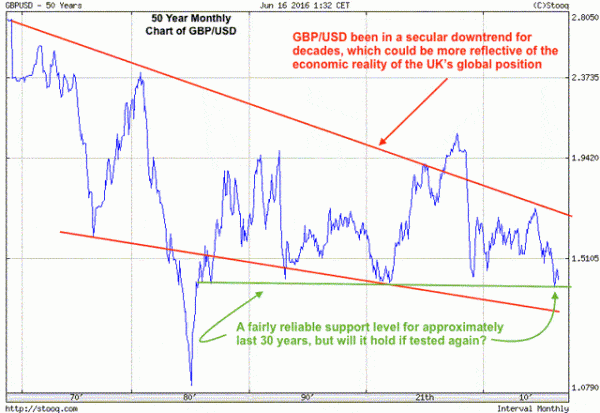Emotions are reaching a fever pitch in the UK, as the June 23rd “Brexit” referendum draws near. On its surface, the vote appears to be simple decision that will restore British sovereignty by replacing EU membership with a standard trade agreement, but passions over the impending decision are getting out of hand. Brits are currently in shock after the fatal shooting of a well-respected British Labour MP, Jo Cox. She “was shot and stabbed several times in her constituency town of Birstall, near Leeds in northern England, on Thursday lunchtime outside a local library where she had been meeting residents.”
Politicians and parties alike have condemned her killing, and the rather heated rhetoric, related to the UK’s future membership ties with the EU, has suddenly come down a notch. A nationally televised debate is currently scheduled two days before the referendum is to take place.
Financial markets have been gyrating for months, after Prime Minister Cameron announced the proposed referendum date back on the 22nd of February. Pollsters have been active since that February day, publishing endless surveys of the body politic to evaluate prevailing opinions. These opinions have shifted continually back and forth, leading to an increased level of uncertainty as to the eventual outcome. Where there is uncertainty, volatility follows, and, with it, opportunity.

Beyond campaign histrionics and the horror of a public assassination, the broad-based assessment of the UK leaving the EU is not an apocalyptic one. Yes, there is confusion, and the fires of populism have been unnecessarily stoked to a high level, but the actual impact might resemble “Y2K”, if anyone reading this article is old enough to remember the hysteria surrounding the millennium crossover. Every software program on the planet with a date dependency was supposed to crash when midnight struck. All the hoopla was for naught. Nothing happened. The sun rose in the east. All was well.
What is the hoopla about this time around with “Brexit”?
If you look back four decades or even more, this debate of having a favored trade status with the European continent has been raging for quite some time. The pivotal point came in 1975 when the UK populace voted with 67% in the affirmative to join the European Community (Common Market). One out of three voters did not agree and have argued vehemently their position ever since that fateful day. The basic arguments break down as follows:
- For Staying: “Those who want to stay say that a medium-size island needs to be part of a larger bloc of like-minded countries to have real influence and security in the world, and that leaving would be economically costly.”
For Leaving: “Those who favor leaving argue that the European Union has changed enormously over the last four decades with regard to the size and the reach of its bureaucracy, diminishing British influence and sovereignty.”
One barometer of the potential financial impacts can be se in the behavior of Pound Sterling with respect to other currencies. The “GBP/USD” pair has been in descent since late 2014, falling from 1.72 to as low as 1.39, an historical level of strong support. More recently, it has ranged as high as 1.48, when polls briefly suggested a “Remain” vote outcome, but it now hovers about the 1.43 range. A more long-term view is presented in the chart below:
The Pound is currently testing a serious level of historical support, as designated by the “Green” line. The important 1.35 to 1.40 region has not been penetrated since the financial crisis in 1980. Yes, the Pound has been in a long-term “secular downtrend” for more than fifty years, but no one has been forecasting the doom and gloom that the “Head & Shoulders” formation from 1990 forward might represent. If the important “Neckline” position does not hold, are we then looking at parity with the greenback or something much worse?
If one hones in on what the local pundits are saying in Great Britain, then you hear a cacophony of abuse heaped upon the Euro experiment and the intransigence of EU officials to bite the bullet on social reforms and resolve authority infrastructure issues. The rise in populism is not just a UK phenomenon. It is also happening throughout Europe, as well. The singular opinion that is heard is that, “Countries are shifting toward a more protectionist stance and working to reclaim greater independence and sovereignty. What we have today more broadly is a European Union that is slowly breaking apart.”
British pundits, however, rarely mince words, but rather go directly for the jugular vein: “Today’s EU is a deformed halfway house that nobody ever wanted. There has been no truth and reconciliation commission for the greatest economic crime of modern times. We do not know who exactly was responsible for anything because power was exercised through a shadowy interplay of elites in Berlin, Frankfurt, Brussels, and Paris, and still is. Everything is deniable. All slips through the crack of oversight. You can equally argue that the high watermark of EU integration has passed: the Project is in irreversible decay.” It sounds like Brits do not want to be left holding the bag on this one.
What are the potential financial impacts from a forex trader’s perspective?
Where are the prevailing forex trading opportunities? As always, markets tend to anticipate the financial impacts of event risk before it ever takes place. As a trader, you know that, for big events, markets always overshoot the mark, leading to great fading opportunities. If the build up beforehand is too great, then be prepared for a “Sell-on-the-News” reaction in the market. Let caution be your watchword, and be prepared.
The most likely avenue to trade is the “GBP/USD” pair, but veterans are also following the “EUR/GBP”, “EUR/USD”, and “AUD/USD” pairs, as well. As of this writing, the respective values for each of these pairs in the forex market were 1.435, 0.785, 1.128, and 0.739. From these starting values, you may then evaluate the projections of the following banks as to what might take place going forward. Keep in mind that banks are not the best forecasters of the future, but at least you can see what the group is thinking with regards to a potential UK exit from the EU:
- BBVA: GBP/USD to drop to 1.20; EUR/GBP moves to 0.85-0.90;
- BMO: GBP/USD moves to 1.33 and EUR/GBP moves to 0.83;
- BOFAML: GBP/USD toward mid-1.20 area;
- CITIGROUP: GBP/USD down 5% on the day, as much as 12% over following month;
- CREDIT AGRICOLE: GBP/USD to drop to 1.30 or lower; EUR/GBP to trade close to 0.85 or higher;
- DEUTSCHE BANK: GBP -10% on TWI basis; GBP/USD to 1.15 by year-end; EUR/GBP to 0.90;
- GOLDMAN SACHS: GBP -10% on TWI basis; GBP/USD could move to ~1.15-1.30; EUR/GBP to ~0.90-0.95; EUR/USD to fall ~4%;
- HSBC: GBP/USD to fall ~5-10%;
- INTESA SANPAOLO: GBP/USD to 1.35-1.40; EUR/GBP to 0.80-0.85;
- JPMORGAN: GBP/USD to fall to 1.32; EUR/GBP 0.85;
- MORGAN STANLEY: GBP/USD to 1.30 by yr-end; EUR/USD could fall to 1.00;
- NOMURA: GBP to fall ~10-15% on TWI basis;
- NORDEA: EUR/GBP above 0.85 (+7%); EUR/USD below 1.10;
- RABOBANK: GBP/USD at 1.26 in 1m; EUR/GBP at 0.86 in 1m;
- RBC: GBP/USD to 1.15 by end of June;
- SOCIETE GENERALE: GBP/USD to move through 1.35-1.30;
- UBS: EUR/GBP may go to parity;
- UNICREDIT: More than 10% drop vs. USD on multi-week basis;
- WELLS FARGO: GBP trade weighted value may decline as much as 8%-9% in near-term;
This summarization of banking forecasts comes to us, courtesy of Fortress Capital. If you accept the consensus of this group, then there still seems to be adequate time to short or go long on a few of these specific forex pairings. These dire predictions, however, are the bankers’ predictions as to what might happen if the “Leave” vote becomes the new reality. Current polls suggest an edge of “52/48” in favor of leaving, but there is still a large contingent of undecided voters that could swing heavily for the status quo, thereby reversing this dire prognostication.
What are the current polls saying about the potential vote on June 23rd?
Today is a good time to be working for a polling company. In the UK, every newspaper, news agency, and tabloid press rag has continually reported and updated the latest in consumer opinion on this topic. Financial markets had been calm for a few months when the “Stay” group amassed a ten-percentage point lead on the “Leave” camp. Those figures did a complete 180 in the past few weeks, giving the “Leave” group a leg up with a “52/48” split heading into election week. Stocks on the London exchange took a beating, but the FTSE 100 has recovered and stabilized.
Analysts were quick to question the implications of these latest poll results. There was recently a Scottish secession vote that followed a similar process, but when it came time to vote, the block of undecided voters and perhaps a few saner minds prevailed to maintain the status quo. If you combine the most recent polls, you arrive at an estimate of 10% for undecided citizens. Polls also suggest that younger citizens are very much for leaving, but they rarely show up in big numbers when ballots are cast. Lastly, the odds from bookmakers are solidly behind staying in the EU, a fact that may surely trump any independent polling of consumers. These folks have real money on the line.
Concluding Remarks
Traders, investors, and speculators – It’s time to place your bets or hedges, if that be the case. There seems to be ample opportunity for gain, but, as always, there is no sure thing when it comes to predicting markets or how people will vote in elections. One thing is certain, however, and that is that there will be volatility, both before, during, and after the referendum takes place. Brokers are already warning their clients to prepare for wild times ahead. Check your open positions, and protect against any apparent downside risk. Now is not the time to be caught flatfooted.
As for potential opportunities, the Pound, Euro, and Aussie are good places to start. If you like to dabble down a path less taken, a few adventuresome types have been following the rise of BitCoin values. After languishing around $400, it has risen lately to $700. Is this crypto-currency the new safe haven? The more traditional approach would be to buy Gold or Silver, which have also appreciated of late.
Whatever you do, enjoy the rollercoaster ride to come!

 Between 74-89% of CFD traders lose
Between 74-89% of CFD traders lose  Your capital is at risk
Your capital is at risk  Your capital is at risk
Your capital is at risk  Your capital is at risk
Your capital is at risk